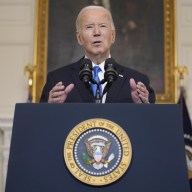By Joe Bavier
JOHANNESBURG (Reuters) – As Donald Trump’s tariff salvos threaten global trade wars, leaders from the BRICS bloc – Brazil, Russia, India, China and South Africa – are expected to band together in defense of the multilateralism the United States once championed.
The heads of the major emerging nations meet in Johannesburg from Wednesday for their first summit since Trump’s administration launched a push to rebalance trade relationships that the U.S. President has deemed unfair.
From threatening to tear up existing trade deals to hiking steel and aluminum tariffs, the U.S. move toward unilateral action has rattled traditional allies and rivals alike. And BRICS nations have been on the frontline of the global tensions.
Last week Trump said he was ready to impose tariffs on all $500 billion of imported goods from rival economic superpower China. But even South Africa – a tiny exporter of steel, aluminum and automobiles to the United States – is facing barriers.
“If you don’t have an agreed rules-based trade system then it’s a matter of power. And unilateralism is not something you want to contemplate,” Rob Davies, trade minister of the bloc’s current chair, South Africa, told Reuters.
BRICS’ dominant member China has stressed the need to fight protectionism and promote multilateral global trade.
“We are against unilateralism – we are in favor of free trade,” Chinese Premier Li Keqiang said earlier this month in response to Trump’s trade moves.
From its origin as an acronym coined in 2001 by then-Goldman Sachs chairman Jim O’Neill, BRICS has struggled to take shape as a body voicing cohesive positions on politics and forging deeper trade ties.
Its collective gross domestic product grew more than six-fold from $2.7 trillion in 2000 to over $17 trillion last year, eclipsing that of the European Union.
However, the value of trade between its members has actually fallen nearly 9 percent to $312 billion over the past five years, according to Johannesburg-based Standard Bank.
Analysts say global trade turmoil could give the group a shot in the arm.
“BRICS knew what they weren’t – i.e. Western – without quite knowing what they were,” said Martyn Davies, Deloitte Managing Director for emerging markets and Africa. “Now with the Trump administration, suddenly there’s an emerging common interest, ironically around trade.”
“SPECIAL TIMES”
Though they will not condemn the United States, BRICS leaders will staunchly defend multilateralism and organizations including the World Trade Organisation, according to a diplomat involved in drafting the summit’s final statement.
“The language of the statement will not be standard language because we live in special times,” the diplomat said.
A push to foster trade flows between BRICS member states is also expected, officials and analysts said.
Those efforts include bolstering the New Development Bank (NDB), the grouping’s financial institution.
Russia said this month it was in talks with the bank about borrowing more than $1 billion. On Monday, it approved loans totaling $600 million for energy and transportation projects in South Africa and China.
The NDB is expected to lend $4 billion to BRICS members this year. And South African deputy foreign minister Luwellyn Landers said this week the bank would begin lending to non-members, giving BRICS more clout as representative of the “global South”.
South Africa has invited the leaders of 22 additional countries to participate in this week’s summit, including 19 from Africa.
“There is a pretty big space for the BRICS nations to work together … to create economic heft and ease the negative impacts of unilateralism and trade protectionism,” said Mei Guanqun of the China Center for International Economic Exchanges, a state-backed think-tank.
As the member hardest-hit by Trump’s trade moves, China is looking to diversify its trade ties to mitigate fallout.
Some analysts say agreeing preferential trade policies between BRICS members is a logical next step. But that may prove to be a bridge too far, at least for now.
Beijing already dominates BRICS and is involved in 80 percent of trade within the bloc. Opening the door to more and cheaper Chinese imports could be seen as too great a risk for the group’s smaller, less industrialized members.
“All those who are affected by lesser access into the U.S. market are likely to want to diversify their exports and just push everything into everybody else’s backyard,” said South Africa’s Davies. “I don’t think that would be desirable.”
(Additional reporting by Christian Shepherd in Beijing, Anthony Boadle in Brasilia and Katya Golubkova in Moscow, Editing by Ros Russell)


















